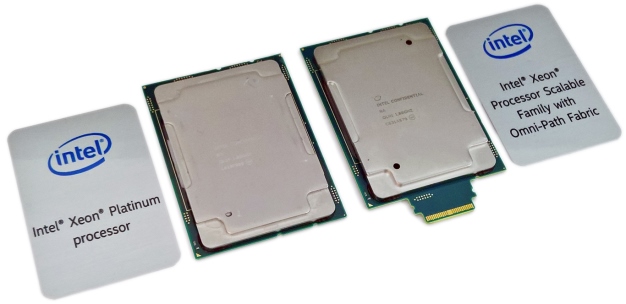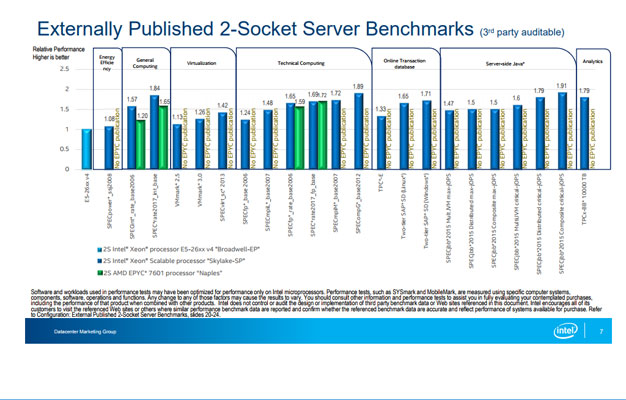Intel recently touted an array of benchmarks comparing
its latest
Xeon Scalable Processors (Skylake-SP) in a two-socket configuration to the performance of a similarly configured 2P Xeon E5026xx v4 (Broadwell-EP) system and a competing dual socket
AMD EPYC 7601-based system. In discussing the benchmarks, however, Intel makes it clear that the results are all externally published and that the they are third-party auditable, to ensure no one can cry foul when comparing the results.
It should be noted, however, that Intel used its own compilers for these tests. On the AMD system, a combination of GNU open source and Open64 LLVM compilers were used. Intel does state that the software and workloads used in the tests might have been better optimized for performance on the Intel processors, mostly because EPYC is a recent entrant into the space.
The benchmarks run the competing systems through a number of tests to evaluate energy efficiency, general computing, virtualization, technical computing, online transaction databases, server-side Java workloads, and other big-data analytics workloads.

The only EPYC results that were available for comparison were in the general computing and technical computing test. The Intel-based systems handily trounce the EPYC system in those there. However, it should be noted that AMD has an advantage in terms of pricing when it comes to EPYC. Intel's Xeon Platinum 8160M processor has an MSRP of $13,011, whereas AMD's EPYC 7601 is priced at around $4,800.
NextPlatform also did some of its own analysis into Intel's performance claims. It spoke to Dave Hill, head of the Data Center Group product marketing arm at Intel. Hill does admit that in Intel's own testing internally of the EPYC platform, AMD did grab the lead in some benchmarks, especially with regards to memory sensitive workloads where EPYC's additional memory channels come into play.
"What we are seeing at a high level is that we are leading on the majority of the workloads, but AMD does lead on some memory bound workloads," Hill tells The Next Platform. "As far as the key thing of performance per core, a lot of cloud workloads have grown up around the single-threaded performance of Xeon in the past ten years, and that is one of our key advantages. There is always a single-threaded bottleneck in some workload somewhere."

Another interesting tidbit of note is that Intel's own Xeon SP-6148 Gold chip is less than half the price of the high-end Xeon Platinum 8160M, and its performance is very close to that of its more expensive sibling. Interestingly, there has been indications that Intel may be planning to become more aggressive with pricing, given AMD's resurgence in a market. And we can't forget that Qualcomm is looking to make waves as well with its Centriq 2400 family of ARM-based server processors. Qualcomm is promising competitive performance, lower power consumption and value pricing to win over customers from Intel and AMD.






